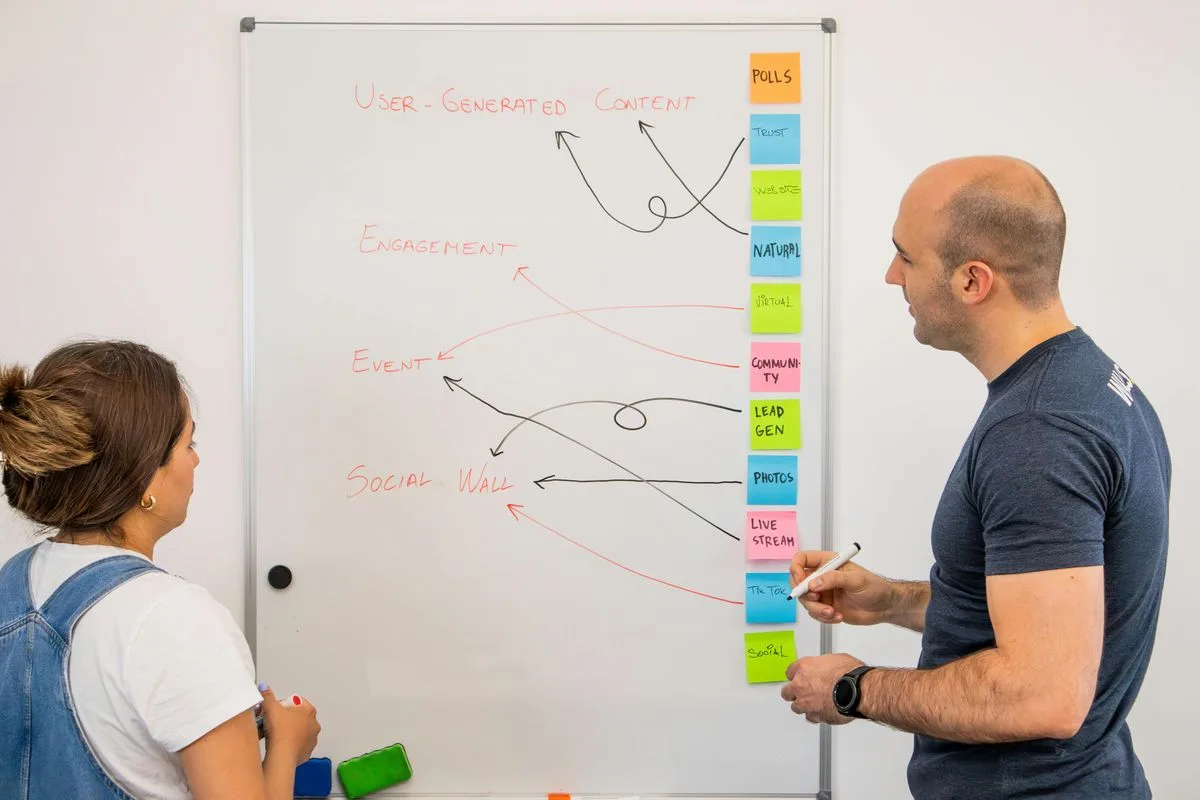Growleady Team
Lead Generation Experts
What is a B2B Developer? Role in Software Solutions
Discover how B2B developers shape enterprise software by addressing complex needs, integrating new tech, and balancing scalability with security.

Ever wondered about the tech wizards behind those sleek business-to-business platforms? Meet the B2B developer – the unsung hero of the corporate digital world. These coding maestros are the backbone of companies that sell products or services to other businesses.
B2B developers aren't just your average programmers. They're the masterminds who create complex systems that keep the gears of commerce turning smoothly. From e-commerce platforms to inventory management systems, these tech gurus build the digital infrastructure that businesses rely on daily. But what sets them apart from other developers? And why should you care about their unique skillset? Let's immerse and explore the intriguing area of B2B development together.
Understanding B2B Development

B2B development involves creating software solutions that cater to the specific needs of businesses. These solutions aim to streamline operations, enhance efficiency, and reduce costs for organizations across various industries.
Defining B2B in the Tech World
In the tech world, B2B (Business-to-Business) refers to the exchange of products, services, or information between companies rather than between a business and a consumer. B2B software solutions are designed to address complex business challenges and help seamless interactions between different organizations.
Key aspects of B2B in the tech world include:
Enterprise-level solutions
Scalable platforms
Integration capabilities
Data security and compliance
Customization options
B2B tech solutions often focus on improving collaboration, automating processes, and providing valuable insights through data analysis. Examples include customer relationship management (CRM) systems, enterprise resource planning (ERP) software, and supply chain management tools.
The Role of a B2B Developer
B2B developers are the architects behind these sophisticated business solutions. Their role encompasses a wide range of responsibilities and requires a unique skill set to address the complex needs of enterprise clients.
Key responsibilities of a B2B developer:
Designing and developing robust software applications
Integrating multiple systems and APIs
Ensuring scalability and performance
Implementing security measures and data protection
Collaborating with cross-functional teams
B2B developers often work on projects that involve:
Custom software development
Cloud-based solutions (SaaS, PaaS, IaaS)
Enterprise mobile applications
Data analytics and business intelligence tools
E-commerce platforms for B2B transactions
To succeed in B2B development, you'll need a mix of technical expertise and business acumen. Understanding industry-specific requirements and regulatory compliance is crucial. You'll often work with legacy systems, so knowledge of older technologies and integration techniques is valuable.
Common challenges in B2B development include:
Long development cycles
Complex approval processes
Integration with existing systems
Balancing customization with scalability
Meeting strict security and compliance standards
To overcome these challenges, focus on:
Agile development methodologies
Modular architecture for flexibility
Robust testing and quality assurance
Clear communication with stakeholders
Continuous learning and staying updated on industry trends
By understanding the intricacies of B2B development, you'll be better equipped to create impactful solutions that drive business growth and efficiency for your clients.
Key Skills of a B2B Developer
B2B developers possess a unique set of skills that enable them to create robust, scalable solutions for businesses. These skills span technical expertise, business acumen, and communication abilities.
Technical Expertise
B2B developers excel in programming languages and technologies crucial for enterprise-level software development. They're proficient in:
Backend languages like Java, C#, or Python
Frontend technologies such as JavaScript, React, or Angular
Database management systems like SQL Server or Oracle
Cloud platforms like AWS, Azure, or Google Cloud
Their expertise extends to:
Designing scalable architectures that can handle high volumes of data and users
Implementing robust security measures to protect sensitive business information
Optimizing performance for complex business processes
Integrating disparate systems and APIs
At GrowLeady, these technical skills are leveraged to build sophisticated B2B solutions that meet diverse business needs. GrowLeady's team of developers exemplifies the cutting-edge expertise required to stay ahead in the fast-evolving tech landscape, integrating the latest advancements to ensure seamless, scalable, and secure solutions.
Business Acumen
A deep understanding of business processes sets B2B developers apart. They:
Analyze complex business requirements and translate them into technical solutions
Understand industry-specific regulations and compliance standards
Identify opportunities for process automation and efficiency improvements
Align software solutions with business goals and KPIs
Their business knowledge allows them to:
Provide strategic input during project planning
Suggest innovative solutions that address specific business challenges
Understand the impact of software on different aspects of business operations
Collaborate effectively with stakeholders from various departments
This combination of technical and business expertise enables B2B developers to create solutions that truly add value to their clients' operations.
Communication and Collaboration
Effective communication is crucial for B2B developers. They excel at:
Explaining technical concepts to non-technical stakeholders
Collaborating with cross-functional teams, including product managers, designers, and QA specialists
Presenting project progress and outcomes to clients and executives
Documenting complex systems and processes for future reference
Their collaboration skills include:
Participating in agile development processes
Conducting effective code reviews and providing constructive feedback
Mentoring junior developers and sharing knowledge within the team
Managing client expectations and addressing concerns proactively
By combining technical expertise, business acumen, and strong communication skills, B2B developers play a pivotal role in creating software solutions that drive business success and foster long-term partnerships with clients.
Common B2B Development Projects
B2B developers tackle a wide range of projects that cater to the complex needs of businesses. These projects often involve creating sophisticated solutions that streamline operations, enhance productivity, and drive growth for organizations across various industries.
Enterprise Software Solutions
Enterprise software solutions are the backbone of many B2B development projects. These comprehensive systems are designed to address specific business needs and improve overall efficiency. Here's what you need to know about enterprise software solutions:
They're tailored to handle large-scale operations and complex processes
Examples include Customer Relationship Management (CRM) systems, Enterprise Resource Planning (ERP) software, and Supply Chain Management (SCM) tools
These solutions often require integration with existing systems and databases
Scalability is a key feature, allowing the software to grow with the business
User interfaces are designed for efficiency rather than aesthetics, focusing on functionality and quick data access
When developing enterprise software, you'll need to consider factors like data security, user permissions, and compliance with industry regulations. It's crucial to work closely with stakeholders to ensure the solution aligns with business goals and processes.
API Integration
API integration is a critical aspect of B2B development, enabling seamless communication between different software systems. Here's why it's important and what it involves:
APIs allow different applications to exchange data and functionality
They're essential for creating interconnected ecosystems of business tools
Common API integrations include payment gateways, CRM systems, and marketing automation platforms
RESTful APIs are widely used due to their simplicity and scalability
Security is paramount, often requiring OAuth authentication and encryption
When working on API integration projects, you'll need to:
Understand the API documentation thoroughly
Handle data mapping between systems
Carry out error handling and logging mechanisms
Ensure proper data synchronization and consistency
Optimize performance to handle high volumes of requests
Remember, successful API integration requires careful planning and testing to ensure smooth data flow between systems.
Data Management Systems
Data management systems are crucial for businesses to store, organize, and analyze their vast amounts of information. As a B2B developer, you'll often work on projects involving:
Database design and optimization
Data warehousing solutions
Business intelligence and analytics tools
Master data management systems
Data migration and integration services
When developing data management systems, consider:
Scalability to handle growing data volumes
Data security and compliance with regulations like GDPR or HIPAA
Performance optimization for quick data retrieval and analysis
Data cleansing and deduplication processes
Backup and disaster recovery mechanisms
It's essential to work closely with data analysts and business stakeholders to understand their specific needs and design systems that provide valuable insights for decision-making.
By focusing on these common B2B development projects, you'll be well-equipped to create robust, scalable solutions that address the complex needs of businesses across various industries. Remember to stay up-to-date with the latest technologies and best practices in each area to deliver high-quality, innovative solutions to your clients.
Challenges Faced by B2B Developers

B2B developers encounter unique obstacles when creating solutions for businesses. These challenges stem from the complex nature of enterprise software and the diverse needs of different industries. Let's explore the key hurdles B2B developers must overcome to deliver successful projects.
Complex Business Requirements
B2B developers grapple with intricate business processes that vary across industries. You'll often find yourself diving deep into unfamiliar sectors, deciphering complex workflows, and translating them into functional software solutions. This complexity requires:
Extensive research and analysis of industry-specific needs
Collaboration with subject matter experts to understand nuanced processes
Flexibility in design to accommodate diverse business rules and regulations
Ability to balance standardization with customization for each client
To navigate these challenges, develop a systematic approach to requirements gathering. Use tools like mind maps or process flow diagrams to visualize complex systems. Remember, the key is to break down intricate processes into manageable components without losing sight of the big picture.
Long Development Cycles
B2B projects typically span longer timelines compared to B2C applications. You're looking at:
Extended planning and design phases
Multiple iterations and feedback loops
Comprehensive testing across various business scenarios
Phased rollouts and ongoing maintenance
These lengthy cycles can lead to:
Scope creep
Changing market conditions
Evolving client requirements
Technological advancements during development
To manage these challenges, adopt agile methodologies that allow for flexibility and continuous delivery. Break the project into smaller, manageable sprints. This approach helps you:
Deliver value incrementally
Adapt to changing requirements
Maintain stakeholder engagement throughout the process
Remember, communication is crucial. Keep all stakeholders informed about progress, challenges, and adjustments to expectations.
Integration with Legacy Systems
One of the most daunting tasks for B2B developers is integrating new solutions with existing legacy systems. You'll encounter:
Outdated technologies and platforms
Lack of documentation
Limited API support
Data migration complexities
To tackle these integration challenges:
Conduct a thorough assessment of existing systems
Design robust APIs and middleware solutions
Carry out data transformation layers
Create comprehensive testing scenarios for integration points
Consider using integration platforms or iPaaS (Integration Platform as a Service) solutions to streamline the process. These tools can help bridge the gap between modern and legacy systems, reducing development time and potential errors.
By understanding and preparing for these challenges, you'll be better equipped to navigate the complex world of B2B development. Remember, each obstacle presents an opportunity to showcase your problem-solving skills and deliver value to your clients.
The Future of B2B Development
The future of B2B development is rapidly evolving, driven by technological advancements and changing business needs. As businesses increasingly rely on digital solutions, B2B developers play a crucial role in shaping the world of enterprise software.
Emerging Technologies in B2B
B2B developers are at the forefront of integrating cutting-edge technologies into business solutions. Artificial Intelligence (AI) and Machine Learning (ML) are revolutionizing data analysis and decision-making processes. For example, AI-powered chatbots handle customer inquiries, while ML algorithms optimize supply chain management.
Blockchain technology is gaining traction in B2B applications, enhancing security and transparency in transactions. It's particularly useful in industries like finance and logistics, where trust and traceability are paramount.
The Internet of Things (IoT) is another game-changer. B2B developers are creating interconnected systems that collect and analyze data from various devices, improving efficiency and enabling predictive maintenance in manufacturing and industrial sectors.
Cloud computing continues to be a cornerstone of B2B development. Developers are leveraging cloud platforms to build scalable, flexible solutions that can be accessed from anywhere, facilitating remote work and global collaboration.
Evolving Developer Responsibilities
As B2B development evolves, so do the responsibilities of developers. They're no longer just coders; they're becoming strategic partners in business transformation.
Data security and privacy are top priorities. B2B developers must stay updated on the latest cybersecurity threats and carry out robust protection measures. They're responsible for ensuring compliance with data protection regulations like GDPR and CCPA.
User experience (UX) design is gaining importance in B2B applications. Developers are expected to create intuitive interfaces that simplify complex business processes, improving productivity and user satisfaction.
API development and integration are becoming crucial skills. B2B developers need to create and maintain APIs that allow seamless communication between different systems and help partnerships between businesses.
Agile methodologies are becoming the norm in B2B development. Developers must adapt to iterative development cycles, collaborating closely with business stakeholders to deliver solutions that meet evolving needs.
Continuous learning is essential. B2B developers must stay abreast of new technologies, programming languages, and industry trends to remain competitive and provide innovative solutions to their clients.
Conclusion
B2B developers play a crucial role in shaping the digital world for businesses. They're at the forefront of creating sophisticated enterprise solutions that drive efficiency scalability and innovation. As technology evolves B2B developers must adapt embracing new tools and methodologies to meet complex business needs.
The future of B2B development is bright with opportunities to leverage cutting-edge technologies and create transformative solutions. By staying current with industry trends and honing their skills B2B developers can continue to deliver high-value customized software that propels businesses forward in an increasingly digital world.
Frequently Asked Questions
What is B2B software development?
B2B software development refers to creating software solutions specifically for businesses to use in their operations or to sell to other businesses. It focuses on enterprise-level applications, scalability, integration capabilities, and customization options to meet complex business needs.
How does B2B development differ from B2C development?
B2B development typically involves more complex requirements, longer development cycles, and a focus on integration with existing systems. It prioritizes functionality, scalability, and security over consumer-friendly interfaces. B2B solutions often require more customization and have stricter compliance standards compared to B2C applications.
What are the main challenges in B2B software development?
Key challenges include meeting complex business requirements, managing long development cycles, integrating with legacy systems, ensuring data security and compliance, and balancing customization with scalability. B2B developers must also stay updated with emerging technologies and industry-specific regulations.
How are emerging technologies impacting B2B software development?
Emerging technologies like AI, machine learning, blockchain, IoT, and cloud computing are revolutionizing B2B software development. They're enabling more intelligent, efficient, and scalable solutions. Developers must integrate these technologies to create innovative products that provide businesses with competitive advantages and improved operational efficiencies.
What skills are essential for B2B developers?
Essential skills for B2B developers include proficiency in enterprise-level programming languages, database management, API development, and cloud technologies. They should also have strong problem-solving abilities, understanding of business processes, knowledge of data security practices, and experience with agile methodologies. Continuous learning is crucial to stay updated with evolving technologies.
How important is data security in B2B software development?
Data security is paramount in B2B software development. Developers must implement robust security measures to protect sensitive business data, ensure compliance with industry regulations, and maintain client trust. This includes encryption, secure authentication methods, regular security audits, and staying updated on the latest security threats and mitigation strategies.
What role does user experience (UX) play in B2B software?
While functionality is key, user experience is increasingly important in B2B software. Good UX design can improve adoption rates, user productivity, and overall satisfaction. B2B developers must balance complex features with intuitive interfaces, considering the diverse needs of various user roles within an organization.


